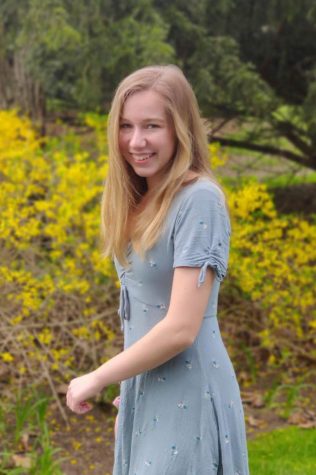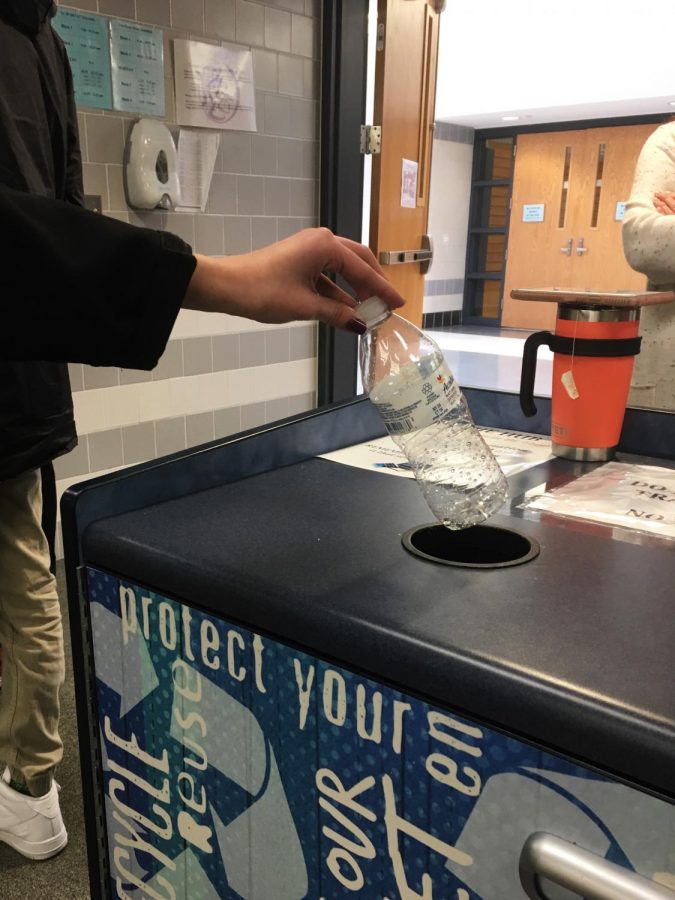Changes to Recycling Protocol Coming to Southern Lehigh
Many of the items tossed in cafeteria recycling bins are not recycled.
“Reduce, reuse, recycle.” Those three words have been nailed into the heads of every high school student since kindergarten. All around the school, bright blue recycling bins can can be found in classrooms, hallways, and in the cafeteria. On the surface, it would seem natural to assume that Southern Lehigh has the issue of recycling under control.
However, the lack of recycling in the school was brought to light during a student advisory meeting in early December. According to head custodian Mrs. Shannon Faleski, almost everything in the school recycling bins gets put in the trash.
In previous years, most of the recycling was picked up by Charles Chrin Hauling company, the business in charge of collecting the district’s trash. However, since the beginning of the school year, the company has cut back on what they accept as recycling.
“Everything was getting mixed up. They were getting dirty recycling…cans that were still half full, that kind of stuff,” Mrs. Faleski said. “So they pretty much said nothing can go in the recycling bins anymore unless it’s clean and empty.”
Custodians, for both health reasons and for a lack of time, are not allowed to sort through the trash. Therefore, the contents in all of the bins in school — even the blue bins meant for recycling — must be thrown away. Thus, the amount of trash has skyrocketed in 2018 alone.
In addition to the stricter rules regarding the condition of the materials, the company has also restricted the kinds of recyclables they’re willing to accept. Materials such as styrofoam, shredded paper, napkins, coffee cups, and plastic bags are not recyclable.
“It really surprised me that a lot of paper isn’t recycled,” sophomore Fotoula Kokolas said. “I didn’t realize that throwing away things like tissues is such a big problem. A lot of recycling in our school gets thrown away because people put things they think are recyclable like tissues and it just all gets thrown away.”
Currently, the only materials being recycled are cardboard boxes and some shipping containers from the cafeteria. Mrs. Faleski hopes that with student involvement and awareness around the school, more things can be recycled.
“If we could just get a hold of what we have in the cafeteria during lunches–the water bottles, the juice bottles, and the soda containers–if we could get a handle on people just emptying those and throwing them in the recycling, that would be a great start,” Mrs. Faleski said. “If they’re empty, even if they’re not technically clean, I think we could get away with throwing those in the recycling and not have an issue.”
Following the student advisory meeting where the issue was raised, a group of eight students met with Mrs. Faleski in early December. Together, they discussed solutions to increase recycling in the school.
“I think it’s really good that we’re finally talking about it,” sophomore Jack Ziets said. “Recycling is really important, and it surprised me how little we’re doing right now.”
In addition to short-term methods, the group is looking into expanding the recycling committee to involve more students and teachers. Other suggestions included creating competitions between homerooms for the most reusable water bottles, or setting up volunteer hours to help collect recycling.
“This is only the beginning,” Mrs. Faleski said, “but if we could just spread awareness overall, that’s a big step in the right direction.”
If you have any questions or are interested in joining the recycling committee, please email Mrs. Faleski at [email protected] for more information.

Saskia Van’t Hof is a fourth-year staff reporter and second-year Editor-in-Chief and Opinion Editor for the Spotlight. She is also president of Key Club,...


